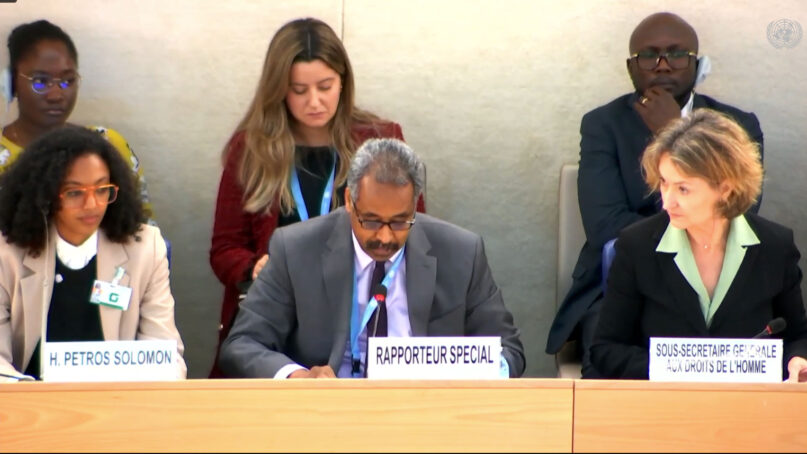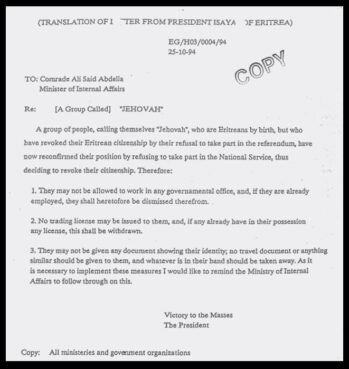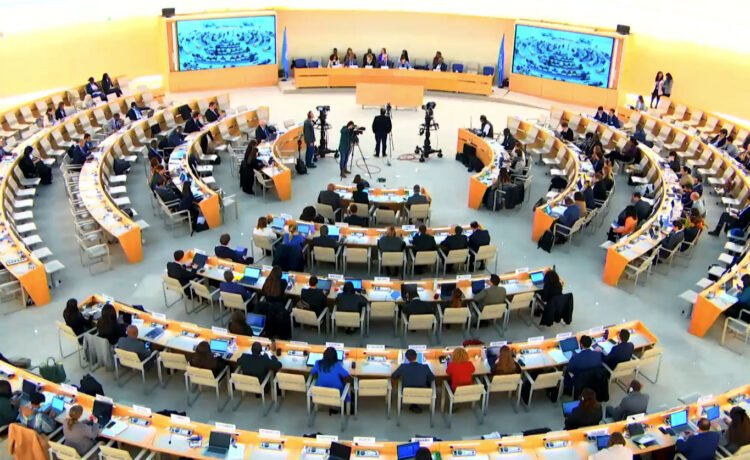(RNS) — Thirty years after Eritrea revoked the citizenship of Jehovah’s Witnesses, international human rights experts are condemning the nation’s persecution of the religious group and advocating for the release of wrongfully detained prisoners.
“As of the latest information available, 64 Jehovah’s Witness worshippers remain in detention for exercising their faith,” Mohamed Babiker, a United Nations expert on Eritrea’s observance of human rights, reported to the body’s committee on social, humanitarian and cultural issues on Oct. 30. “Just last month, 25 Jehovah’s Witnesses, including two children, were arrested. While the two minors were later released, the 23 adults were reportedly transported to Mai Serwa prison.”
The September raid, the first major action against Jehovah’s Witnesses in Eritrea since 2014, broke up a worship service at the home of Letebrhan Tesfay, 85, one of the first Eritreans to become a Jehovah’s Witness, according to Jarrod Lopes, a U.S. spokesperson for the group.
Tesfay, who was among those arrested, “outlasted the oppression under Emperor Haile Selassie and is poised to do the same again,” Lopes said in an email. “Witnesses currently facing ruthless persecution for their faith share the same determination, hope, and inner peace as the Witnesses who proved faithful before them.”
Those imprisoned in the raid have not been formally charged, tried or sentenced, a Jehovah’s Witnesses report alleged. In a 2023 report, the U.S. State Department said Eritrean prisoners commonly face “harsh” and “life threatening” prison conditions.

Mohamed Babiker, a U.N. expert on human rights in Eritrea, delivers a report to the U.N.’s committee on social, humanitarian and cultural issues on Oct. 30, 2024. Video screen grab
In light of the arrests, human rights experts have chosen to speak up as the anniversary of the denial of citizenship approached. On Oct. 25, the United States Commission on International Religious Freedom shared statements from two of its commissioners on X.
“We are concerned for Jehovah’s Witnesses in #Eritrea, particularly those who are imprisoned, many of whom have been held unjustly for decades under horrific conditions,” said a statement attributed to Commissioner Vicky Hartzler. “@StateDept should continue to work for their release, freedom, and citizenship.”
Jehovah’s Witnesses, whose beliefs don’t allow them to participate in the military, refused to be recruits in the Eritrean War of Independence between the Ethiopian government and separatists from 1961 to 1991. While Jehovah’s Witnesses characterized their lack of participation as political neutrality, not opposition to Eritrean independence, the Eritrean government responded by stripping Jehovah’s Witnesses of their citizenship. Since then, 270 Jehovah’s Witnesses have been imprisoned in Eritrea, according to the faith group.

An English translation of the Presidential Decree granting Eritrea independence on Oct. 25, 1994. Courtesy of Jehovah’s Witnesses
Many Jehovah’s Witnesses in Eritrea are effectively barred from holding government jobs, receiving government benefits and accessing bank accounts. The lack of official documents also prevents many Jehovah’s Witnesses from owning property, finding employment or leaving the country. Worship must also be conducted in secret.
They aren’t the only faith group facing opposition in Eritrea. In addition to the more than 60 Jehovah’s Witnesses being held, hundreds of other Christians are being arbitrarily imprisoned, according to Babiker.
“I urge the Eritrean government to take bold and comprehensive action to address the human rights situation in the country,” said Babiker at the U.N. committee meeting. “Meaningful and genuine reforms can only set Eritrea on a path toward a society where human rights are upheld and fulfilled.”
You Might Also Like
New book calls for authentic engagement and equity in organizations
The Nine Asks by Kimberly Danielle Organizations have a responsibility to ensure that people who come there to work, worship,...
‘Holy Hurt’ is Hillary McBride’s field guide to the shattering impact of spiritual trauma
(RNS) — Trauma is a lot like having a shard of glass in your hand, explains clinical psychologist Hillary McBride....
So You Married a Priest? + Beth Allison Barr
It’s ministry by marriage. Did you know there are piles of guidebooks meant to help women excel at...
Abyssinian Baptist Church welcomes dismissal of pastor candidate’s discrimination suit
(RNS) — A federal judge has dismissed a gender discrimination lawsuit brought against Abyssinian Baptist Church by a onetime candidate...










